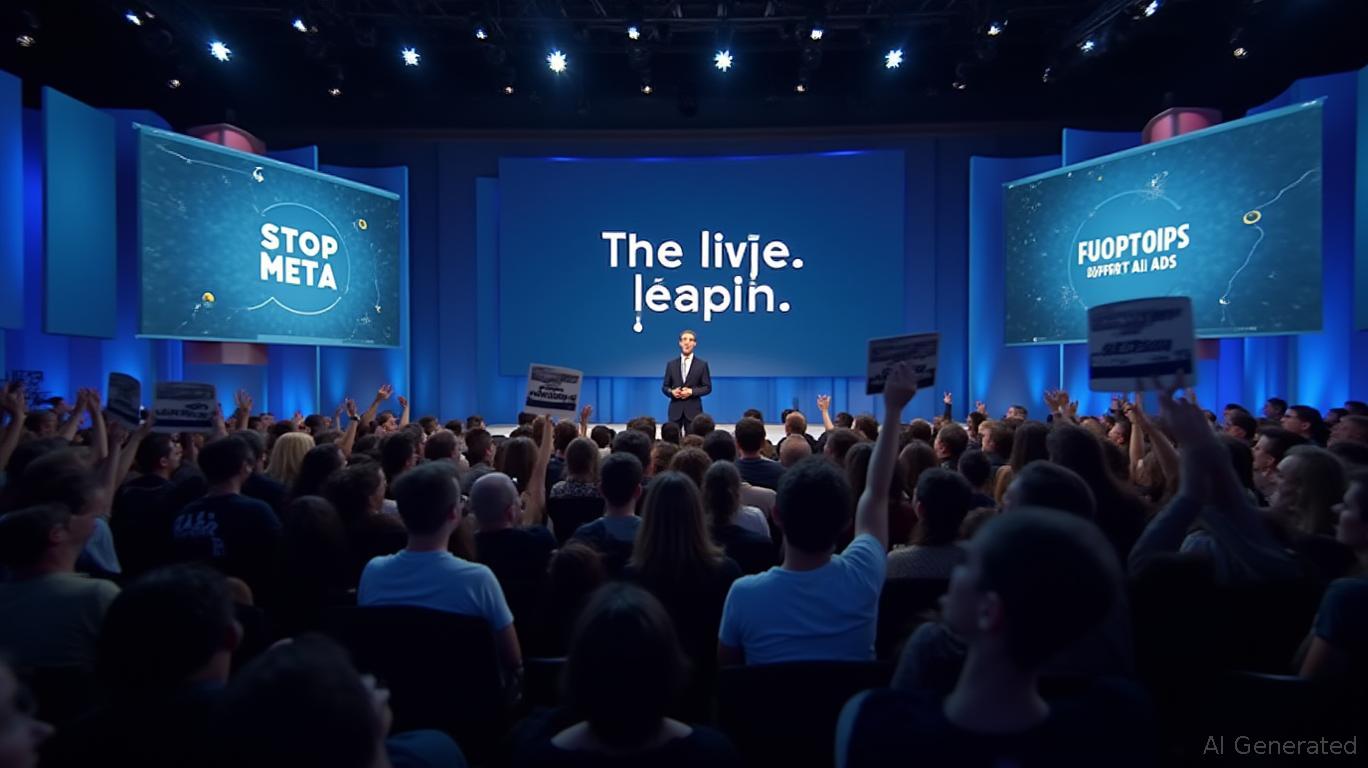Meta's introduction of AI-powered advertisements ignites a discussion on privacy concerns versus technological advancement as their launch approaches
- Meta will launch AI-driven hyper-targeted ads using first-party data from chat interactions starting Dec 16, 2025. - The strategy excludes sensitive topics and complies with GDPR in the EU, but U.S. users lack opt-out options, raising privacy concerns. - Experts warn of data collection incentives and potential industry shifts toward stricter privacy frameworks. - Meta's approach aims to boost engagement and advertiser ROI while competing in the AI-advertising landscape.
Meta Platforms Inc. (META) plans to transform its advertising platform by utilizing data from user interactions with its AI features to provide highly personalized ads and content, beginning December 16, 2025, as reported by a
This development follows a broader industry trend where advertising platforms increasingly use AI to interpret user activity without relying on third-party cookies. Notably, Meta’s rollout will exclude sensitive categories such as health and politics to address privacy concerns. The company stresses adherence to local laws, including the EU’s GDPR, which allows users to opt out of this data use for advertising. However, in the United States, users will not have an opt-out option, prompting debate over data rights and openness.

Reactions from industry professionals are varied. Linguist Emily Bender cautions that the update may motivate Meta to create AI tools that encourage users to spend more time interacting, thereby collecting more data. Meanwhile, digital marketing agencies such as Ignite Visibility note that advertisers can adapt by adopting first-party data strategies to remain compliant while expanding their audience.
Meta’s strategy also highlights its efforts to stay ahead in the AI-driven advertising sector. As rivals like X (formerly Twitter) test AI for ad improvements, Meta’s use of AI chat data could set new standards for highly targeted marketing. Experts believe this move could shape industry practices, encouraging stronger privacy protections as companies balance innovation with consumer confidence.
Elsewhere, several companies have announced notable financial results. The Vita Coco Company (COCO) has raised its full-year 2025 outlook, now expecting net sales between $580 million and $595 million, fueled by robust coconut water demand and new product launches, according to a
On the global stage, financial results were mixed. Samsung Electro-Mechanics Co. (009150.KS) saw its Q3 2025 net profit jump 91% year-over-year to 219.85 billion won, thanks to increased sales and operating profits, according to a
In regulatory developments, Beijing courts sentenced five people to prison terms ranging from 2 to 4 years for operating a USDT-based foreign exchange scheme that illegally transferred $1.18 billion overseas, according to a
Disclaimer: The content of this article solely reflects the author's opinion and does not represent the platform in any capacity. This article is not intended to serve as a reference for making investment decisions.
You may also like
Caribbean Prepares for Hurricane as Geopolitical Strains and Reductions in Food Assistance Loom
- Hurricane Melissa, a Category 4 storm, threatens Jamaica with catastrophic flooding and landslides as it intensifies before landfall. - U.S.-Trinidad military drills face Venezuela's "false-flag" accusations, highlighting regional tensions amid natural disaster preparations. - Trump administration's Nov. 1 food aid cuts draw bipartisan criticism, forcing states to redirect SNAP recipients amid hurricane supply chain risks. - U.S.-China trade talks aim to avoid tariffs over rare earths, while Canada faces

Bitchat's Bluetooth system remains robust while hurricanes severely damage Jamaica's infrastructure
- Bitchat, a Bluetooth-based decentralized messaging app, became Jamaica's second-most downloaded app as Hurricane Melissa crippled infrastructure with 185-mph winds. - The storm killed 30+ people across the Caribbean, including 23 in Haiti, while the app enabled encrypted communication during power outages and flooding. - Bitchat's surge mirrored crisis adoption in Nepal, Indonesia, and Madagascar, highlighting its utility in disaster zones with decentralized, censorship-resistant networks. - The Trump ad

MoonBull's Scarcity Approach Surpasses TON, LINK's Lackluster Progress
- MoonBull's presale raised $450k from 1,500+ investors, projecting 9,256% returns if tokens hit $0.00616. - Outpaces stagnant TON and LINK amid market volatility, leveraging 23-stage pricing and 95% APY staking. - Mobunomics allocates 73.2B tokens with 50% presale scarcity and 11% referral incentives to boost adoption. - Meme-driven narrative combines viral marketing with utility, attracting both retail and institutional investors. - Stage 5 marks final entry before listing, with escalating prices and lim

HBAR ETF Gets Green Light, But Convincing Altcoin Doubters Remains Challenging
- Hedera's HBAR token dropped 6% post-ETF approval, contrasting with Solana's $56M debut volume. - The $8M HBAR ETF launch highlights altcoin market skepticism despite regulatory progress and institutional backing. - Technical indicators like death cross and declining on-chain metrics signal bearish momentum for HBAR. - Analysts note ETFs provide regulated institutional access, though broader crypto volatility and SEC delays dampen immediate adoption. - Hedera's enterprise partnerships and USDC growth on i
